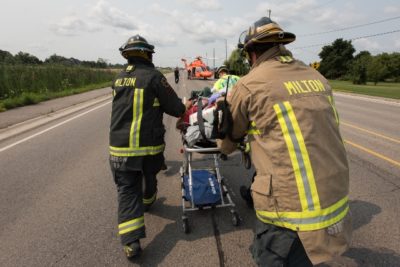Ornge launches project to improve timely access to trauma care for severely injured patients
By Dr. Brodie Nolan
The phones in Ornge’s Operations Control Centre (OCC) ring 24 hours per day, 7 days per week for air ambulance responses across Ontario. Ornge, Ontario’s provider of air ambulance and critical care transport services, transports the most critically ill and injured patients in the province. Approximately 95 per cent of Ornge transports are inter-facility, or hospital to hospital, while the remaining transports are on scene trauma patients.

Patients who are treated at a trauma centre have better odds of survival. Likewise, a delay to receiving care at a trauma centre can result in patient harm. It’s hard to talk about trauma systems without mentioning the concept of the “Golden Hour”, where there is a goal to get severely injured patients to a trauma centre within 60 minutes of injury.
The pre-hospital care system and emergency medical services therefore are an essential component within a trauma system and there is an incredible amount of coordination required to ensure that severely injured patients get appropriate care. For many patients, this involves bypassing a local hospital to go directly to a trauma centre. However, Canadian geography can present a barrier to prompt access to care. In fact, 40 per cent of patients in Ontario live further than a 60-minute drive to a trauma centre. These patients rely on an air ambulance scene response. Sometimes, however that system doesn’t work as well as it could.
A recent study of Ornge scene requests found that 35 per cent of trauma scene calls destined for Toronto trauma centres were cancelled, but yet 25 per cent of those patients were still eventually transported to a trauma centre. It also found this resulted in an average delay of 3.5 hours. Unfortunately, the reason why Ornge was cancelled was unclear over half the time.
To better understand the reasons behind trauma scene call cancellation, Ornge is beginning a project with the intent of improving timely access to trauma care for severely injured patients. The project will involve many phases, the first of which is to obtain accurate, timely and actionable information on why Ornge is being cancelled from trauma scene calls. The purpose is to understand why Ornge is being cancelled from a call and to follow-up to see if patients are eventually transferred to a trauma centre or are able to have appropriate care provided at their local hospital.
Going forward, when Ornge is being cancelled from a trauma scene call, they will be asking the attending paramedics and Ambulance Communications Officer (ACO) to provide one of the following four reasons:
- Patient did not meet Field Trauma Triage Standards
- Land EMS taking the patient directly to trauma centre
- Patient is pronounced deceased
- Patient refusing transport
If the ACO has not obtained this information from the attending paramedics, when possible, they will contact the crew directly to confirm the reason.
It’s important to remember that, in many cases, there is an alternative option to cancelling the air ambulance which could help reduce delays in transport. In instances where the local responding paramedics have cancelled an Ornge response and transported the patient to a local hospital, it is recommended they update the OCC and responding Ornge crew as to the patient’s condition and the hospital they are transporting to, rather than cancelling. This would allow Ornge to coordinate what’s known as a “modified scene response.” — This occurs when Ornge is dispatched to an alternate landing site which is not the geographic location of an incident. The Ornge crew can rendezvous with the land Paramedic Service, either at the hospital or on route, for patients who may still require transport to a trauma centre.
Dr. Brodie Nolan is an Ornge Transport Physician and Trauma Team Leader at St. Michael’s Hospital in Toronto.



